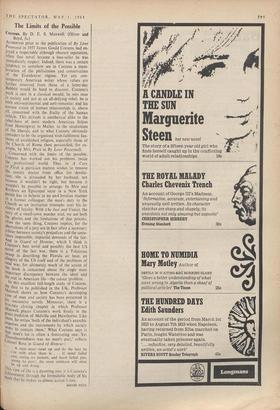The Limits of the Possible
Cozzens. By D. E. S. Maxwell. (Oliver and Boyd, 5s.)
ALTHowl' prior to the publication of By Love Possessed in 1957 James Gould Cozzens had en-
joyed a respectable although obscure reputation, when that novel became a best-seller he was immediately suspect. Indeed, there was a certain tendency to somehow see in Cozzens a mani- festation of the Philistinism and conservatism of the Eisenhower regime. Yet any con- temporary American writer whose values are farther removed from those of a latter-day Babbitt would be hard to discover. Cozzens's Work is cast in a classical mould; he sees man in society and not as an all-defying rebel; he is both anti-sentimental and anti-romantic; and his austere vision of human relationships is, above all, concerned with the frailty of the human vehicle. This attitude is antithetical alike to the rebel-hero of most modern American fiction
from Hemingway to Mailer, to the utopianism
of the liberals, and to what Cozzens obviously Considers to be the organised wish-fulfilment fan-
tasies of established religion, especially those of the Church of Rome (best personified, for ex- ample, by Mrs. Pratt in By Love Possessed).
Concerned with the limits of the possible, Cozzens has worked out his problems inside
the professional world. Thus in A Cure 01 Flesh a patrician matron wishes to remove the county doctor from office for derelic-
tion; she is dissuaded by her husband, not
because it wouldn't be right, but because it wouldn't be possible to arrange. In Men and
Brethren an Episcopal vicar in a New York Parish has to behave in an un-Christian manner to a former colleague; the man's duty to the Church as an institution triumphs over his in-
stincts of loyalty. With The Just and Unjust, the Story of a small-town murder trial, we see, both the glories and the limitations of due process, Often the same thing, Cozzens implies, for the aberrations of a jury are in fact often a necessary
arbiter between society's prejudices and the some-
limes impossible, impartial demands of the law. And in Guard of Honour, which I think is Cozzens's best novel and possibly the best US novel of the last war, there is a Tolstoyan Sweep in describing the Florida air base, an allegory of the US itself and of the problems of total war, for ultimately much of the action of the book is concerned about the single most ImPortant discrepancy between the ideal and the real in American life—the colour problem. , In this excellent full-length study of Cozzens, Le first to be published in the UK, Professor N:laxwell shows us how Cozzens's developing
new of man and society has been presented in n's successive novels. Moreover, there is a first-rate closing chapter in which Professor -gaxweii places Cozzens's work firmly in the great tradition of Melville and Hawthorne. Like !here, he writes 'both of the individual's anarchic
In1Pulses and the instruments by which society seeks to contain them.' What Cozzens says is that man's lot is often a frustrating one. Yet cuownheartedness was no man's part,' reflects °I°nel Ross in Guard of Honour: A man must stand up and do the best he Can with what there is. . . . If mind failed You, seeing no pattern; and heart failed you, seeing 00 point. the stout stubborn will must be up and doing. his view of life is a daunting one; it is Cozzens's cl_ehievement through the 'formidable body of his work that he makes us almost accept it too.














































 Previous page
Previous page